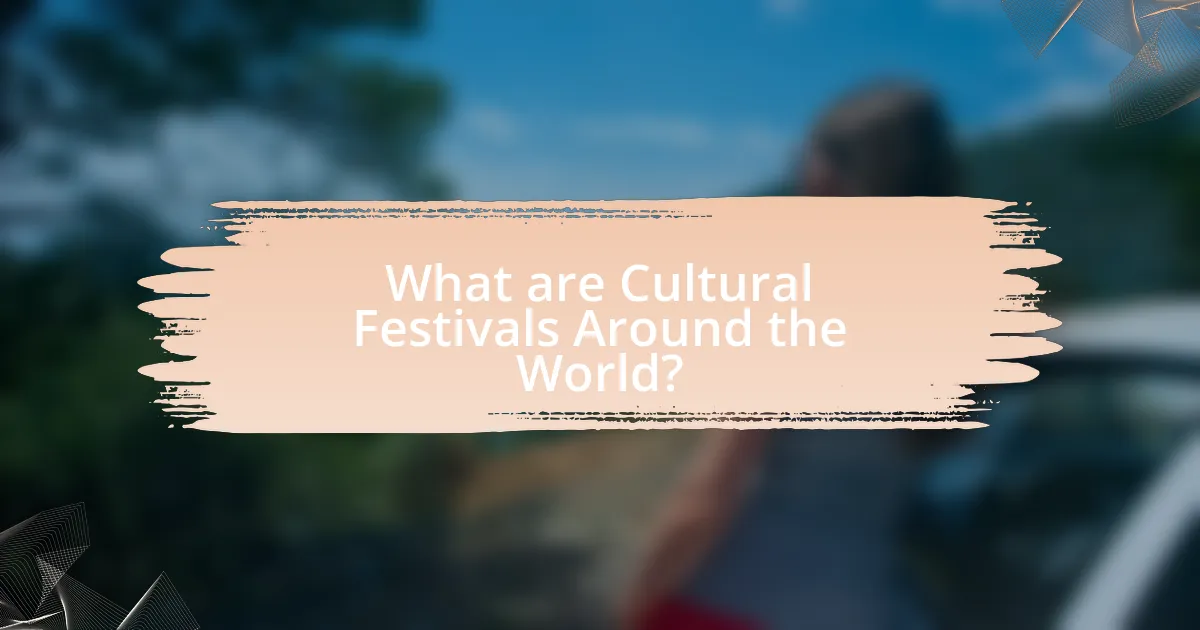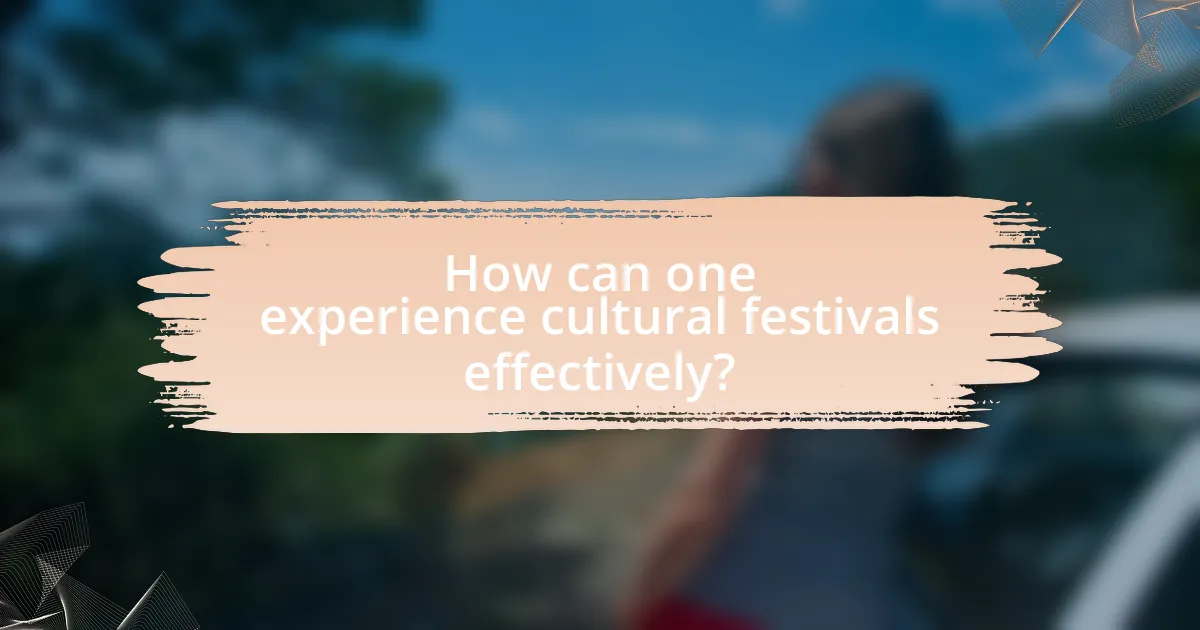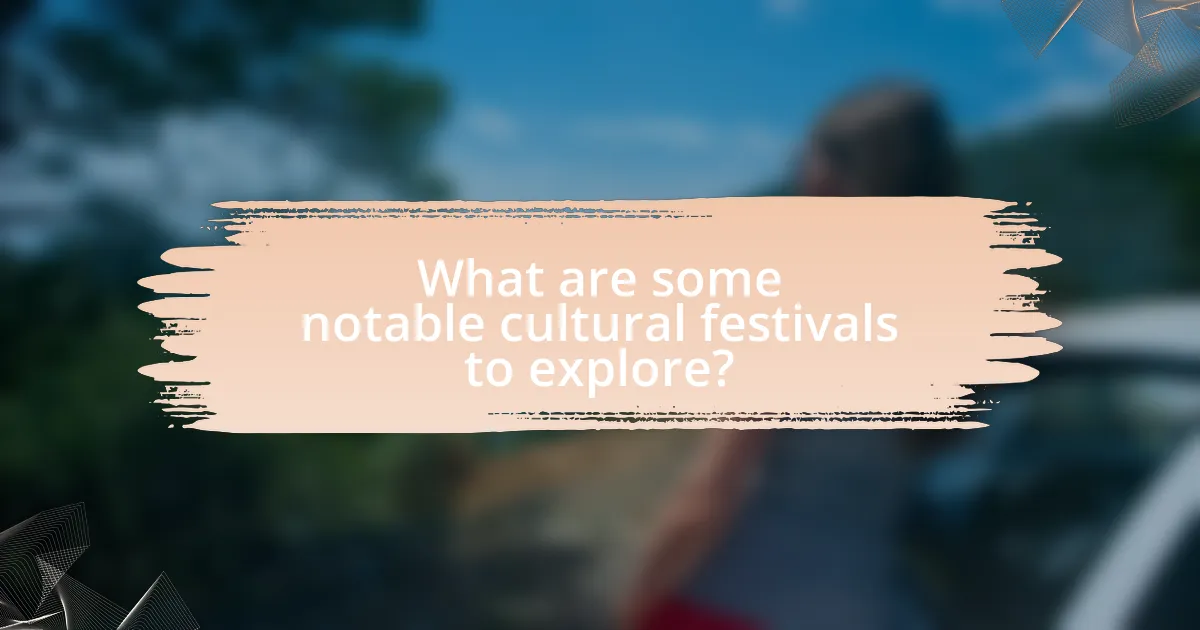Cultural festivals around the world serve as vital events that celebrate the traditions, customs, and heritage of various communities, featuring music, dance, food, and art. These festivals reflect local traditions and foster community identity, showcasing unique cultural expressions through participation in traditional activities and artistic performances. The article categorizes cultural festivals into types such as religious, seasonal, arts and music, food, and historical reenactments, highlighting their significance in promoting cultural heritage and social cohesion. Additionally, it provides insights on how to effectively experience these festivals, including preparation tips, engagement with locals, and the importance of food and music in enhancing the overall experience. Notable festivals like Diwali, Rio Carnival, and Oktoberfest are discussed, emphasizing their unique features and cultural significance.

What are Cultural Festivals Around the World?
Cultural festivals around the world are events that celebrate the traditions, customs, and heritage of various communities. These festivals often include music, dance, food, and art, showcasing the unique cultural identity of the region. For example, the Rio Carnival in Brazil is renowned for its vibrant parades and samba music, while Diwali in India is celebrated with lights, fireworks, and family gatherings, symbolizing the victory of light over darkness. Such festivals not only promote cultural exchange but also attract tourism, contributing significantly to local economies.
How do cultural festivals reflect local traditions?
Cultural festivals reflect local traditions by showcasing the unique customs, beliefs, and practices of a community. These events often include traditional music, dance, food, and rituals that have been passed down through generations, serving as a living expression of cultural heritage. For example, the Diwali festival in India highlights the significance of light over darkness, incorporating rituals and celebrations that are deeply rooted in Hindu mythology. Such festivals not only preserve local traditions but also foster community identity and cohesion, as they bring people together to celebrate shared values and history.
What elements define a cultural festival?
Cultural festivals are defined by several key elements: cultural expression, community participation, traditional activities, and artistic performances. Cultural expression manifests through the celebration of local customs, beliefs, and heritage, often showcased in various forms such as music, dance, and art. Community participation is crucial, as these festivals typically involve local residents actively engaging in the planning and execution of events, fostering a sense of belonging and identity. Traditional activities, including rituals, food, and crafts, highlight the unique aspects of a culture, while artistic performances serve to entertain and educate attendees about the cultural significance of the festival. These elements collectively create an immersive experience that reflects the essence of the community’s cultural identity.
How do festivals vary across different cultures?
Festivals vary across different cultures in their themes, rituals, and significance. For instance, Diwali in India celebrates the victory of light over darkness, while the Day of the Dead in Mexico honors deceased loved ones through vibrant altars and festivities. These cultural differences reflect unique historical, religious, and social contexts, such as the agricultural cycles celebrated in harvest festivals like Thanksgiving in the United States or the Lunar New Year in various Asian cultures, which emphasizes family reunions and ancestral respect. Each festival serves to reinforce community bonds and cultural identity, showcasing the diversity of human expression and tradition.
Why are cultural festivals important for communities?
Cultural festivals are important for communities because they foster social cohesion and promote cultural heritage. These events bring together diverse groups, enhancing community bonds and encouraging participation in shared traditions. For instance, a study by the National Endowment for the Arts found that cultural festivals can increase community engagement by up to 30%, demonstrating their role in strengthening social ties. Additionally, festivals often serve as platforms for local artists and businesses, contributing to economic development and cultural preservation.
How do festivals promote cultural heritage?
Festivals promote cultural heritage by serving as platforms for the expression and preservation of traditional practices, customs, and values. They facilitate community engagement, allowing participants to share and celebrate their unique cultural identities through music, dance, art, and cuisine. For instance, the Diwali festival in India showcases ancient rituals and storytelling, reinforcing the significance of light over darkness in Hindu culture. Additionally, festivals often attract tourism, which can lead to increased awareness and appreciation of local traditions, as seen with the Oktoberfest in Germany, where traditional Bavarian customs are highlighted and celebrated on a global scale. This interaction not only sustains cultural practices but also educates broader audiences about diverse heritages.
What role do festivals play in community bonding?
Festivals play a crucial role in community bonding by fostering social connections and shared cultural experiences among participants. These events bring together individuals from diverse backgrounds, encouraging interaction and collaboration, which strengthens community ties. For instance, research indicates that participation in local festivals can enhance social cohesion, as evidenced by a study published in the Journal of Community Psychology, which found that communities with active festival traditions reported higher levels of trust and cooperation among residents. Thus, festivals serve as vital platforms for building relationships and reinforcing a sense of belonging within communities.
What types of cultural festivals exist globally?
Cultural festivals globally can be categorized into several types, including religious festivals, seasonal festivals, arts and music festivals, food festivals, and historical reenactments. Religious festivals, such as Diwali in India and Ramadan across the Muslim world, celebrate spiritual beliefs and practices. Seasonal festivals, like the Harvest Festival in various cultures, mark agricultural cycles. Arts and music festivals, such as the Edinburgh Festival Fringe, showcase creative expressions. Food festivals, like Oktoberfest in Germany, celebrate local cuisine and beverages. Historical reenactments, such as the Renaissance Fair in the United States, bring history to life through performances and activities. Each type of festival reflects the unique traditions and values of the cultures they represent.
What are the major categories of cultural festivals?
The major categories of cultural festivals include religious festivals, seasonal festivals, arts and music festivals, food festivals, and historical or heritage festivals. Religious festivals, such as Diwali and Christmas, celebrate spiritual beliefs and practices. Seasonal festivals, like harvest festivals, mark changes in seasons and agricultural cycles. Arts and music festivals, such as the Edinburgh Festival Fringe, showcase artistic performances and creativity. Food festivals, like the Taste of Chicago, highlight local cuisine and culinary traditions. Historical or heritage festivals, such as Renaissance fairs, celebrate specific historical periods or cultural heritage. Each category serves to preserve and promote cultural identity and community engagement.
How do seasonal festivals differ from annual celebrations?
Seasonal festivals occur at specific times of the year, often aligned with natural cycles, while annual celebrations take place once a year on a fixed date. Seasonal festivals, such as harvest festivals or spring equinox celebrations, are tied to agricultural or climatic changes, reflecting the rhythms of nature. In contrast, annual celebrations, like New Year’s Day or Independence Day, commemorate historical events or cultural milestones, regardless of seasonal changes. This distinction highlights how seasonal festivals emphasize the connection to nature, whereas annual celebrations focus on cultural heritage and historical significance.

How can one experience cultural festivals effectively?
To experience cultural festivals effectively, one should actively engage with the local community and traditions. This involves participating in festival activities, such as workshops, performances, and local cuisine tastings, which provide deeper insights into the culture. Engaging with locals can enhance understanding and appreciation of the festival’s significance, as many festivals are rooted in historical and cultural contexts. For instance, attending the Diwali festival in India allows individuals to witness the rituals and celebrations that reflect the country’s diverse traditions, fostering a more immersive experience.
What preparations are necessary before attending a festival?
Before attending a festival, essential preparations include researching the event details, securing tickets, and planning accommodations. Researching the festival allows attendees to understand the schedule, location, and any specific cultural practices involved. Securing tickets in advance is crucial, as many festivals sell out quickly, and planning accommodations ensures a convenient stay, especially in popular areas where lodging may be limited. Additionally, packing appropriate clothing and essentials based on the festival’s climate and activities enhances the overall experience.
How can travelers research local festivals?
Travelers can research local festivals by utilizing online resources, local tourism websites, and social media platforms. Online resources such as festival directories and travel blogs provide comprehensive information about dates, locations, and activities associated with various festivals. Local tourism websites often feature event calendars and detailed descriptions of cultural celebrations, ensuring travelers have access to accurate and timely information. Additionally, social media platforms allow travelers to follow local influencers and community pages that share updates and insights about upcoming festivals, enhancing their understanding of local traditions and events.
What should attendees know about festival etiquette?
Attendees should know that festival etiquette includes respecting local customs, being mindful of personal space, and adhering to event rules. Respecting local customs means understanding and participating in traditions, which enhances the experience and shows appreciation for the culture. Being mindful of personal space is crucial, as festivals can be crowded; maintaining a respectful distance helps ensure comfort for everyone. Adhering to event rules, such as designated areas for food and drink or restrictions on photography, is essential for a smooth experience and demonstrates respect for the organizers and fellow attendees.
How can one immerse themselves in the local culture during a festival?
To immerse oneself in the local culture during a festival, actively participate in traditional activities and engage with local customs. This can include joining in on dances, tasting regional foods, and attending workshops that showcase local crafts or performances. For example, during the Diwali festival in India, participating in the lighting of diyas and sharing sweets with neighbors fosters a deeper connection to the cultural significance of the celebration. Engaging with local residents and asking questions about their traditions enhances understanding and appreciation of the cultural context.
What activities should participants engage in?
Participants should engage in traditional performances, local cuisine tastings, and interactive workshops. Traditional performances, such as dance and music, showcase the cultural heritage of the festival’s location, allowing participants to experience the local art forms firsthand. Local cuisine tastings provide an opportunity to sample authentic dishes, which reflect the region’s culinary traditions and ingredients. Interactive workshops, such as craft-making or cooking classes, enable participants to learn skills and techniques that are integral to the local culture, fostering a deeper understanding and appreciation of the traditions being celebrated.
How can food and music enhance the festival experience?
Food and music significantly enhance the festival experience by creating an immersive atmosphere that engages multiple senses. The presence of diverse culinary offerings allows attendees to explore local flavors and traditions, fostering a deeper connection to the culture being celebrated. For instance, festivals like Oktoberfest in Germany showcase traditional foods such as pretzels and sausages, which not only satisfy hunger but also reflect the region’s heritage. Similarly, live music performances, whether traditional folk or contemporary genres, energize the environment and encourage social interaction among festival-goers. Research indicates that music can evoke emotions and memories, further enriching the overall experience. Together, food and music create a vibrant tapestry that embodies the essence of cultural festivals, making them memorable and meaningful events.

What are some notable cultural festivals to explore?
Notable cultural festivals to explore include Diwali in India, which celebrates the victory of light over darkness and attracts millions of participants annually. Another significant festival is Carnival in Brazil, renowned for its vibrant parades and samba music, drawing over two million people each day. Additionally, the Oktoberfest in Germany, the world’s largest beer festival, showcases Bavarian culture and attracts around six million visitors each year. These festivals exemplify rich cultural traditions and offer immersive experiences for attendees.
Which festivals are considered must-see events?
Must-see festivals include the Rio Carnival in Brazil, Oktoberfest in Germany, Diwali in India, and La Tomatina in Spain. The Rio Carnival, celebrated annually, attracts millions with its vibrant parades and samba music, making it the largest carnival in the world. Oktoberfest, held in Munich, is the world’s largest beer festival, drawing over six million visitors each year who enjoy traditional German food and drink. Diwali, known as the Festival of Lights, is celebrated by millions across India and globally, symbolizing the victory of light over darkness. La Tomatina, a unique tomato-throwing festival in Buñol, Spain, sees thousands participate in a massive food fight, showcasing local culture and community spirit. Each of these festivals offers a unique cultural experience, making them essential for travelers seeking to immerse themselves in local traditions.
What unique features make these festivals stand out?
Cultural festivals around the world stand out due to their distinctive traditions, rituals, and community involvement. For instance, the Rio Carnival in Brazil is renowned for its vibrant parades featuring samba dancers and elaborate floats, showcasing the country’s rich musical heritage. Similarly, the Diwali festival in India is characterized by the lighting of oil lamps and fireworks, symbolizing the victory of light over darkness. These unique features not only highlight local customs but also foster a sense of community and cultural identity, making each festival a significant event for participants and visitors alike.
How do these festivals showcase local traditions?
Festivals showcase local traditions by featuring unique cultural practices, rituals, and performances that reflect the heritage of a community. For instance, events like Diwali in India highlight traditional lighting ceremonies and family gatherings, while Oktoberfest in Germany emphasizes local brewing customs and folk music. These festivals often include traditional attire, regional cuisine, and historical reenactments, which serve to educate attendees about the community’s history and values. Such elements not only preserve cultural identity but also promote community cohesion and pride, as evidenced by the participation of local artisans and performers who contribute to the authenticity of the experience.
How can one find lesser-known cultural festivals?
One can find lesser-known cultural festivals by researching local tourism websites, community bulletin boards, and social media platforms that focus on regional events. These sources often highlight unique festivals that may not receive widespread attention. For instance, websites like Eventbrite and Meetup frequently list local gatherings, while platforms like Instagram and Facebook can showcase user-generated content about niche festivals. Additionally, travel blogs and forums such as Lonely Planet and Reddit can provide insights and recommendations from travelers who have experienced these events firsthand.
What resources are available for discovering hidden gems?
Resources available for discovering hidden gems include travel blogs, local tourism websites, and social media platforms. Travel blogs often feature personal experiences and recommendations for lesser-known destinations, while local tourism websites provide insights into regional events and attractions that may not be widely advertised. Social media platforms, particularly Instagram and Pinterest, allow users to explore unique locations through hashtags and geotags, showcasing hidden gems shared by travelers. These resources collectively offer a comprehensive approach to uncovering cultural festivals and local traditions that may otherwise go unnoticed.
How can local tourism boards assist in festival exploration?
Local tourism boards can assist in festival exploration by providing comprehensive information about local events, including schedules, locations, and cultural significance. They often create promotional materials, such as brochures and websites, that highlight upcoming festivals, making it easier for visitors to plan their attendance. Additionally, tourism boards may offer guided tours or partnerships with local businesses to enhance the festival experience, ensuring that attendees can engage with the culture authentically. For example, the Visit Scotland tourism board actively promotes events like the Edinburgh Festival Fringe, showcasing detailed itineraries and local insights that attract both domestic and international visitors.
What tips can enhance your festival experience?
To enhance your festival experience, plan ahead by researching the festival schedule, local customs, and available amenities. Understanding the event’s timeline allows you to prioritize performances and activities that interest you most, ensuring you don’t miss key moments. Additionally, engaging with local traditions, such as participating in traditional dances or trying regional foods, deepens your cultural immersion and appreciation. Studies show that active participation in cultural events increases overall satisfaction and enjoyment, making your experience more memorable.
How can planning ahead improve your visit?
Planning ahead can significantly enhance your visit by ensuring you secure accommodations, tickets, and itineraries that align with your interests and schedule. By organizing these elements in advance, you can avoid last-minute stress and maximize your experience at cultural festivals. Research indicates that travelers who plan their activities are 30% more likely to enjoy their trips, as they can prioritize events and avoid overcrowding, which is common at popular festivals.
What are the best practices for engaging with locals during festivals?
The best practices for engaging with locals during festivals include showing respect for their traditions, participating in activities, and communicating openly. Respecting local customs, such as dress codes or rituals, fosters goodwill and demonstrates appreciation for their culture. Actively participating in festival activities, like dances or food preparation, allows for authentic interactions and shared experiences. Open communication, including asking questions and expressing interest in local stories, builds rapport and encourages locals to share their insights. These practices enhance the festival experience and promote cultural exchange.